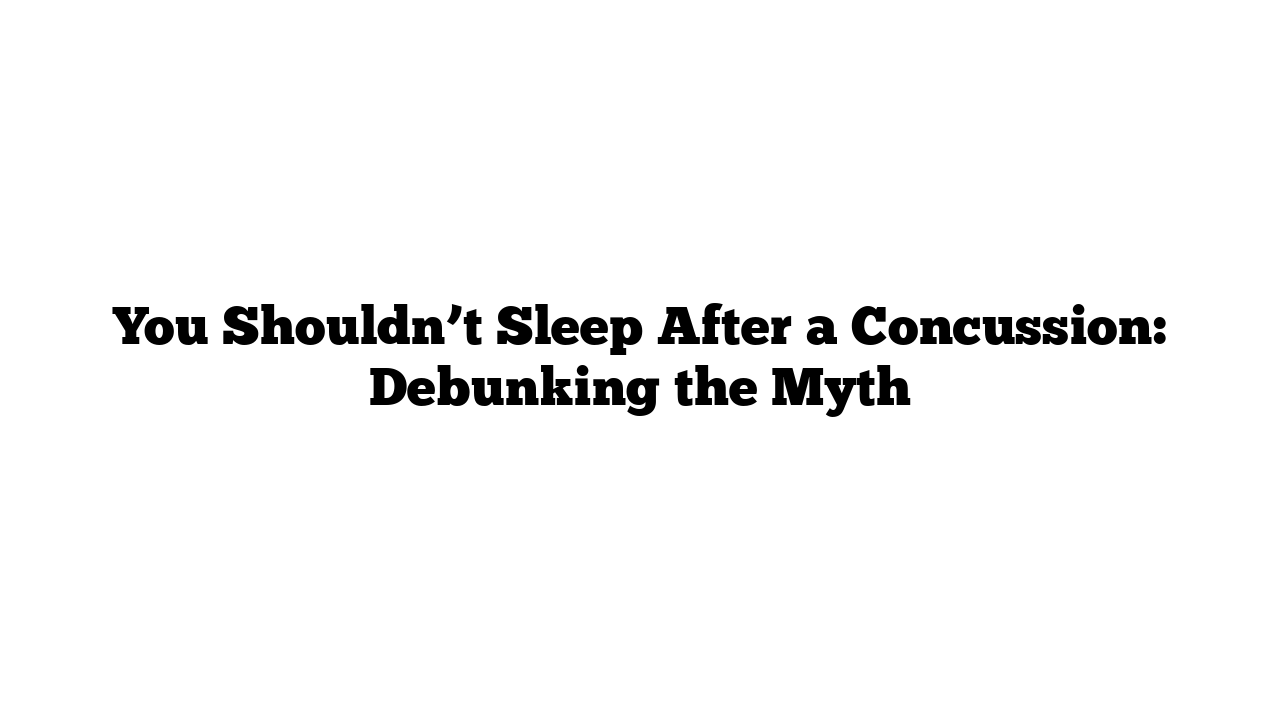Concussions are a serious type of brain injury, often resulting from falls, sports, or car accidents. They can lead to symptoms like dizziness, headache, memory issues, and confusion. For years, there has been a widely accepted belief that sleeping after a concussion is dangerous. But, how accurate is this? Let’s explore the facts and understand why sleep is actually essential for recovery in most cases.
What Is a Concussion?
A concussion is a form of traumatic brain injury (TBI) that occurs when a blow or jolt to the head causes the brain to shift rapidly within the skull. This impact can damage brain cells and disrupt brain function, leading to symptoms such as:
- Headache
- Dizziness
- Blurred vision
- Memory loss
- Confusion
These symptoms vary in severity, but the brain often recovers well with proper rest and gradual activity.
The Origin of the Myth: Why People Say Not to Sleep After a Concussion
For decades, people were told not to sleep after a concussion due to concerns that they might slip into a coma or that sleeping would mask more severe symptoms, making it harder for doctors to diagnose a serious brain injury. This advice was typically rooted in caution, especially before more advanced imaging techniques like CT scans and MRIs were readily available.
The fear was that if someone with a concussion went to sleep, any worsening of symptoms, like a dangerous brain bleed, might go unnoticed. In reality, however, most cases of concussions are mild, and severe complications are rare.
Can You Sleep After a Concussion? What Modern Medicine Says
Today, medical guidelines have evolved, and most doctors agree: It is safe to sleep after a concussion, as long as you’ve been evaluated by a healthcare professional who confirms there’s no risk of a more severe injury. Sleep is actually one of the best things you can do to help the brain heal after a concussion.
Why Sleep is Beneficial After a Concussion:
- Supports Brain Recovery: During sleep, the brain repairs itself, clearing out toxins and promoting cellular repair, which is essential after an injury.
- Reduces Symptoms: Concussion symptoms can worsen with physical and mental activity. Sleep helps the brain conserve energy and minimize symptom flare-ups.
- Prevents Irritability and Fatigue: Concussions often cause fatigue and irritability. Rest helps the brain manage these effects and can improve mood and mental clarity.
When Should You Stay Awake?
While sleep is generally beneficial, there are a few cases where you might need to stay awake or be closely monitored:
- When symptoms are severe: If you have prolonged loss of consciousness, confusion, vomiting, or worsening headaches, seek immediate medical attention instead of sleeping.
- If no doctor has evaluated you: Without a medical evaluation, it’s hard to rule out serious complications. A quick visit to the emergency room for an assessment can help determine whether it’s safe to sleep.
- In cases of severe brain trauma: Some traumatic brain injuries require monitoring for a few hours post-injury to check for changes in symptoms.
If there’s no access to immediate medical care, having someone monitor you for a few hours before resting can be a safe approach.
Tips for Safe Recovery After a Concussion
If your doctor has ruled out serious brain injury and given you the green light to rest, here are some tips to ensure safe recovery:
- Limit screen time: Exposure to screens (like phones, TVs, or computers) can strain the brain and make symptoms worse.
- Avoid physical and mental exertion: Your brain needs time to heal, so avoid intense physical activity and challenging mental tasks.
- Gradually reintroduce activities: After a day or two of rest, slowly begin light activities as your symptoms allow, like brief walks or reading.
- Follow up with your doctor: If symptoms persist or worsen, schedule a follow-up appointment to ensure you’re recovering properly.
Addressing the Common Misconceptions
Let’s clarify a few key points:
- Myth: Sleeping after a concussion is dangerous.
- Fact: Sleep is generally safe and beneficial after a concussion, provided a doctor has ruled out any serious complications.
- Myth: You’ll miss important symptoms if you fall asleep.
- Fact: If a doctor has evaluated you, your symptoms are likely stable, and sleep will not harm your recovery.
Building Trust in Modern Medicine
Understanding concussion care has come a long way in recent years. Most concussions do not cause life-threatening complications, and modern imaging techniques make it easy to detect severe injuries. If you or a loved one has suffered a concussion, trust that rest is part of the healing process. Take the advice of healthcare professionals, follow up as needed, and allow your brain the time it needs to heal.
The Takeaway
If you’ve been evaluated by a doctor and they give you the all-clear, don’t hesitate to rest. Sleep is a powerful tool in the body’s recovery process and can help minimize symptoms and speed up healing. Remember to check with your healthcare provider, take things slowly, and prioritize your recovery. Visit medicaltimes.io for more information on concussion care and other health insights.
